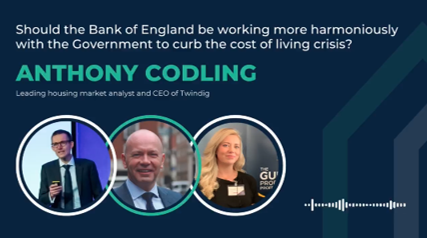What does the mini-budget mean for the UK housing market?
Earlier this week I caught up with the Guild of Property Professionals CEO, Iain McKenzie and Holly Hibbett to discuss the implications of the mini-budget on the UK housing market.
In the mini-budget podcast we discuss:
Why there seems to be a conflict between the Government and the Governor of the Bank of England
Where could interest rates and mortgage rates go from here?
How raising interest rates curbs inflation
Why exchange rates matter even when you aren't going on holiday
The current temperature of the housing market
What the mini-budget means for house prices
Conflict at the highest level: the Government vs the Governor
We appreciate that many column inches have already been written about the mood music in the room when the Kwasi Kwarteng the newly appointed Chancellor of the Exchequer met with Andrew Bailey the Governor of the Bank of England, but in our view, it was somewhat discordant.
In simple terms, the Governor wants to curb demand to calm inflation whereas the Government wants to unleash demand to grow our way out of inflation, to increase the supply of goods and services to meet the rampant demand.
Who is winning?
The markets left little room for doubt that they think the UK Government is taking a big gamble. Firstly there is no evidence that 'trickle-down' tax cuts actually work and secondly the lack of detail about how the GOvernment will continue to fund all the necessary public services following the tax cuts is, putting it as politely as we can, somewhat sketchy.
As we went to press ourselves there is speculation that the Chancellor will need to make a U-turn on some of his policies.
House prices and the mini-budget
The mini-budget let not to a mini-break, nor a holiday for stamp duty, but a permanent holiday. The cut in Stamp Duty will, in theory, make it easier for renters to get onto the housing ladder and for homeowners to move up it, but the stamp duty cut benefit could soon be wiped out by increasing mortgage rates.
However, theory and practice are often very different things. During the COVID-19 pandemic stamp duty cut, average house prices increased by 16 times the average stamp duty saving. Homebuyers ended up paying a lot more for their homes than they did before the stamp duty holiday began.
The upshot is that predicting short-term house prices with any accuracy is very difficult, although house prices do tend to go up in the medium to long term.
To listen to the full podcast click on the button below:
